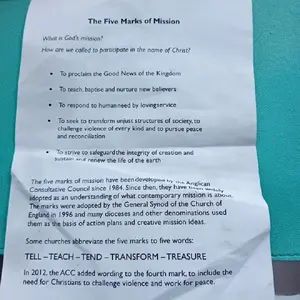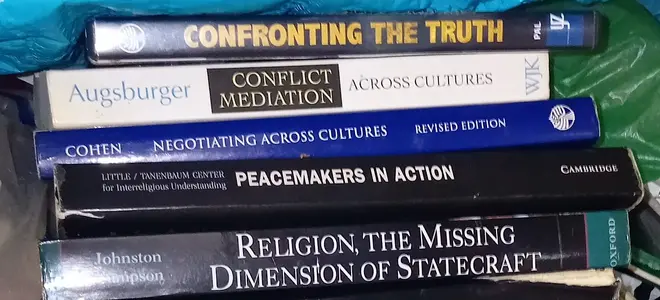Hi everyone- I wanted to share the below with you directly and paste it here, but I cannot as there is a limit to 1,000 words. So, when 1,000 comes I will link to it if you want to read further. I wrote the below for an MA International Relations some years ago. Reading this article again has really reignited my passion in this field of conflict resolution. I am all for highlighting potential avenues for people and will also link to a website where you can learn more about this topic, religious peacebuilding.
I am sharing with you a much shorter version of my article which is friendly for online. I cannot paste the case studies as there is a limitation with the words. This was edited I think by a professional for grammar etc before I submitted it.
So, what do you think, did you know that religion can also be used constructively to resolve conflicts in the international arena. Religion can be used as a force for peace.
...................
With me and my personality I find that my faith's justice principles has given me more zeal to fight against injustice when I sometimes see it.
I will discuss how conflict resolution can be applied to ameliorate modern day destructive conflict in society. In many parts of the world today, especially in developing countries, religion is still an integral part to the lives of many. Religion can be used constructively or destructively and it is the destructive use of religion that often makes headline news whereas the constructive use of religion receives little or no attention.
In this article I will centre on the constructive use of religion faith based conflict resolution which is a form of track 2 diplomacy in application. In this article I will argue that religion can be used constructively to contribute towards resolving conflicts. Therefore religion can be utilised as a force for peace in the international arena.
Faith-based actors have had an impact on the South African Truth and Reconciliation Commission (TRC) and contributed to rebooting South Africa with a new moral consciousness. The Catholic lay international (NGO) Sant' Egidio has helped to play a part in the signing of the Guatemalan peace accords. Faith based actors have also played a part in the peace negotiations in Northern Ireland and I will briefly discuss in this article how this happened. I will also briefly discuss other conflicts that religion has contributed in resolving.
The constructive use of religion has clear implications for conflict resolution. We need to learn how to apply conflict resolution skills and tools in our management of dispute mediation.
I hope some of you enjoy reading it and learning how religion can be used constructively to resolve conflicts.
Introduction
The re-emergence of religion as a political actor in international relations has not gone without tension. Eminent social scientists, such as Max Weber and Auguste Comte, predicted the demise of religion as societies advanced. Instead, in International relations, what we have been witnessing since the 1979 Iranian Revolution is the steady re-emergence of religion as a political actor.
Faith-based actors orientate their peace-building and conflict resolution around the values of their faith and their faith shapes their outlook. They can mediate in conflicts that may be termed religious or have a religious component which does not limit their peace building to conflicts surrounding religion. Secular individuals can also be trained in peace building in religious disputes and peace building initiatives.
Faith based dispute management can be initiated by individual actors or institutions/organisations and by inter-religious councils.
I argue in this article that whilst it cannot be reasonably denied that religion can be used destructively. Faith based conflict resolution, which is a form of track 2 diplomacy or is now sometimes referred to as track 7 diplomacy can also contribute towards resolving conflicts.
This ability of religion to be used constructively or destructively is the dual nature of religion and what is at the heart of Scott Appleby’s terminology the ‘Ambivalence of the Sacred' (Appleby 2000). Faith based conflict resolution offers the potential for rich resources of peace-building that are often missed. The constructive use of religion has clear implications for domestic and international relations.
What we have been witnessing since the end of the Cold War is the destabilisation it left behind.
The legacy of imperialism and colonialism in many parts of the world is also still being felt today. We are also witnessing a reaction against Western supremacy and ideologies in some parts of the world.
Track 1 diplomacy hard power has essentially proved ineffective on its own in managing emerging conflicts. The UN was late to recognise this and this will be discussed further.
Megan Shore makes the case that, if religion is part of the problem then it needs to also be part of the solution (Shore 2009:3). What we have been witnessing are new ways of exploration and rejection, and in some countries this has surfaced through religion, I will explore this further on.
Religion is for many people a strong component of identity, values and norms and therefore, may help determine peoples’ moral compass and what they are willing or not willing to do. This is crucial to take into account within the realms of conflict resolution.
What I aim to demonstrate in this article is the latent potential of faith based conflict resolution and what I present is just the tip of the iceberg but my case studies should be able to provide useful insights for other cases. I concentrate on religions of the Abrahamic faith tradition, but more so Christianity in this article but all religions have the potential to be used constructively. Religious peace builders guided by the underlying principles of their faith can also attempt to get disputants to tap into the positive conflict resolution tools that can be found within their own sacred texts.
The constructive use of Religion in conflict resolution
Meet the Peacemakers - Tanenbaum
I am sharing with you a much shorter version of my article which is friendly for online. I cannot paste the case studies as there is a limitation with the words. This was edited I think by a professional for grammar etc before I submitted it.
So, what do you think, did you know that religion can also be used constructively to resolve conflicts in the international arena. Religion can be used as a force for peace.
...................
The constructive use of Religion in conflict resolution
In Christianity Jesus and God were at heart against violence and they were proportional in use of its application. God’s views are clearly reflected in Psalm 11 "The Lord examines the righteous, but the wicked, those who love violence, he hates with a passion." The Church of England in the UK now works on a model called the five marks of mission. One of the church’s mission is to seek to transform unjust structures of society to challenge violence of every kind and to peruse peace and reconciliation.With me and my personality I find that my faith's justice principles has given me more zeal to fight against injustice when I sometimes see it.
I will discuss how conflict resolution can be applied to ameliorate modern day destructive conflict in society. In many parts of the world today, especially in developing countries, religion is still an integral part to the lives of many. Religion can be used constructively or destructively and it is the destructive use of religion that often makes headline news whereas the constructive use of religion receives little or no attention.
In this article I will centre on the constructive use of religion faith based conflict resolution which is a form of track 2 diplomacy in application. In this article I will argue that religion can be used constructively to contribute towards resolving conflicts. Therefore religion can be utilised as a force for peace in the international arena.
Faith-based actors have had an impact on the South African Truth and Reconciliation Commission (TRC) and contributed to rebooting South Africa with a new moral consciousness. The Catholic lay international (NGO) Sant' Egidio has helped to play a part in the signing of the Guatemalan peace accords. Faith based actors have also played a part in the peace negotiations in Northern Ireland and I will briefly discuss in this article how this happened. I will also briefly discuss other conflicts that religion has contributed in resolving.
The constructive use of religion has clear implications for conflict resolution. We need to learn how to apply conflict resolution skills and tools in our management of dispute mediation.
I hope some of you enjoy reading it and learning how religion can be used constructively to resolve conflicts.
Introduction
The re-emergence of religion as a political actor in international relations has not gone without tension. Eminent social scientists, such as Max Weber and Auguste Comte, predicted the demise of religion as societies advanced. Instead, in International relations, what we have been witnessing since the 1979 Iranian Revolution is the steady re-emergence of religion as a political actor.
Faith-based actors orientate their peace-building and conflict resolution around the values of their faith and their faith shapes their outlook. They can mediate in conflicts that may be termed religious or have a religious component which does not limit their peace building to conflicts surrounding religion. Secular individuals can also be trained in peace building in religious disputes and peace building initiatives.
Faith based dispute management can be initiated by individual actors or institutions/organisations and by inter-religious councils.
I argue in this article that whilst it cannot be reasonably denied that religion can be used destructively. Faith based conflict resolution, which is a form of track 2 diplomacy or is now sometimes referred to as track 7 diplomacy can also contribute towards resolving conflicts.
This ability of religion to be used constructively or destructively is the dual nature of religion and what is at the heart of Scott Appleby’s terminology the ‘Ambivalence of the Sacred' (Appleby 2000). Faith based conflict resolution offers the potential for rich resources of peace-building that are often missed. The constructive use of religion has clear implications for domestic and international relations.
What we have been witnessing since the end of the Cold War is the destabilisation it left behind.
The legacy of imperialism and colonialism in many parts of the world is also still being felt today. We are also witnessing a reaction against Western supremacy and ideologies in some parts of the world.
Track 1 diplomacy hard power has essentially proved ineffective on its own in managing emerging conflicts. The UN was late to recognise this and this will be discussed further.
Megan Shore makes the case that, if religion is part of the problem then it needs to also be part of the solution (Shore 2009:3). What we have been witnessing are new ways of exploration and rejection, and in some countries this has surfaced through religion, I will explore this further on.
Religion is for many people a strong component of identity, values and norms and therefore, may help determine peoples’ moral compass and what they are willing or not willing to do. This is crucial to take into account within the realms of conflict resolution.
What I aim to demonstrate in this article is the latent potential of faith based conflict resolution and what I present is just the tip of the iceberg but my case studies should be able to provide useful insights for other cases. I concentrate on religions of the Abrahamic faith tradition, but more so Christianity in this article but all religions have the potential to be used constructively. Religious peace builders guided by the underlying principles of their faith can also attempt to get disputants to tap into the positive conflict resolution tools that can be found within their own sacred texts.
The constructive use of Religion in conflict resolution
Meet the Peacemakers - Tanenbaum


